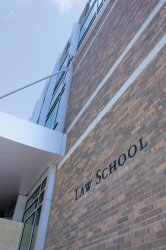
Marquette University Law School officially launched a new clinic this semester to give free services to start-up businesses and entrepreneurs.
The Law and Entrepreneurship Clinic will be able to provide services to those who lack the financial ability to access resources, as well as lack the firsthand experience law students will receive.
The program will be the first in the Milwaukee area to offer legal services to start-up businesses and entrepreneurs who cannot afford legal counsel.
The clinic will be staffed with Marquette law students who, with supervising attorneys, will advise clients on business contracts, commercial leases and funding.
University President Michael Lovell said in a statement that he has been requesting the campus community, since taking office in July 2014, to “embrace innovation and entrepreneurship.”
Presently, the clinic is at limited capacity, staffed with only two students for the spring. Nathan Hammons, director of the clinic and clinical professor, said it has plans to become fully operational in the fall with eight students.
Hammons began working in November as a visiting clinical professor before becoming a full-time faculty member and director of the clinic. Hammons previously ran a private law practice that specialized in early stage entrepreneurs and small businesses.
“Entrepreneurs always need more time to spend on their ideas and innovations, which is exactly what the Law School’s new Law and Entrepreneurship Clinic will allow them to do,” Lovell said. “In return, our students will learn how to have a direct impact on the next wave of start-ups. Together, we’ll advance the region’s reputation as a place where great concepts thrive.”
Hammons said the clinic will run year round to provide continuity to businesses and to provide services to clients throughout the year.
While the Law School offers other pro bono legal services and programs, most notably the Marquette Law Volunteer Legal Clinic, this start-up is because that students will be able to receive credits for their services while gaining workplace experience.
The clinic is supported by donations from the law school’s annual fund.
Hammons said the selection process for the businesses begin with an application, then they evaluate those that are a good fit for the clinic.
“We’re focused on making it work with eight students and we’ll evaluate the services we’re offering to our clients and the benefit of helping to educate law students,” Hammons said. “I think it will be great to help with the development of law students with transactional law or business law and it will provide a great service for the community.”


